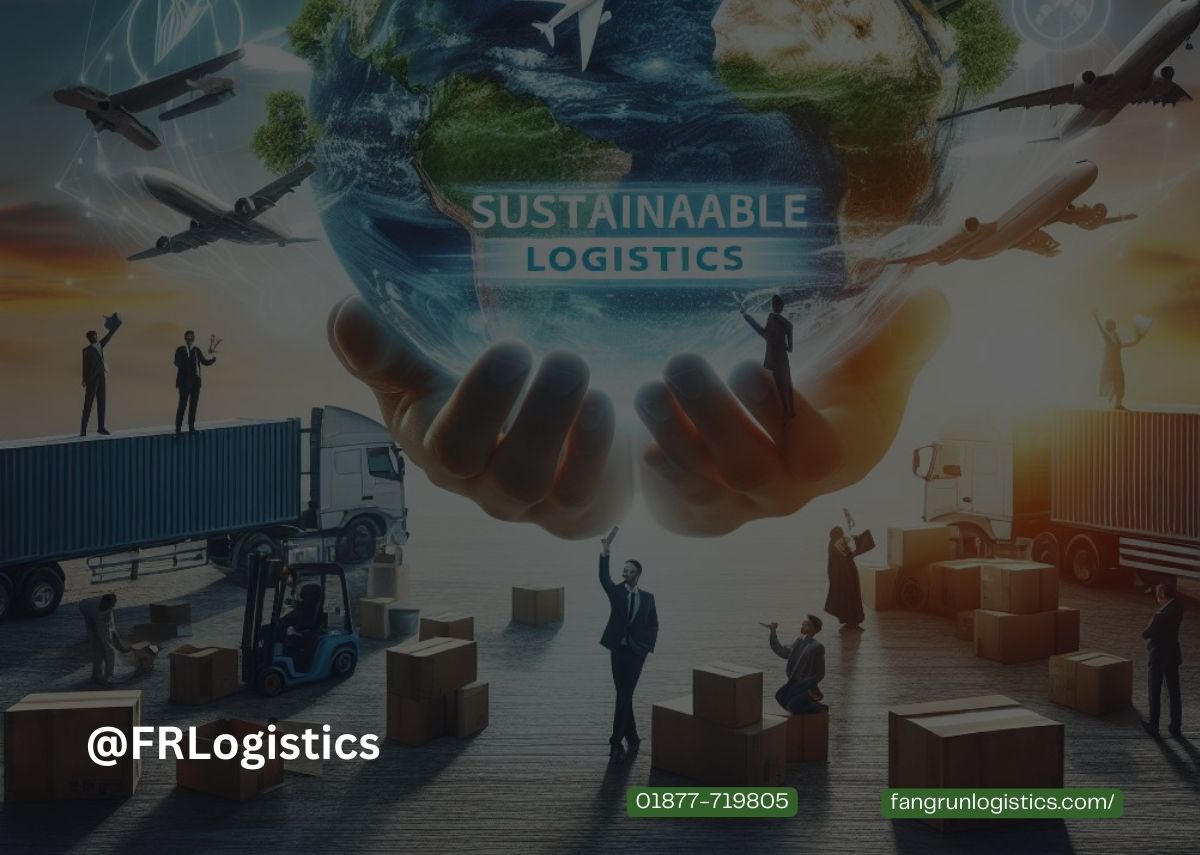The concept of logistics sustainability has emerged as an important force for positive change. Sustainable logistics companies are at the forefront of this category, balancing environmental, social, and economic goals for a harmonious balance.
This article explores key principles, benefits, challenges, and future developments in sustainable logistics, and examines how businesses can adapt to green practices
introduction of Sustainable Logistics Companies
Sustainable Logistics companies to the integration of environmentally friendly, socially responsible, and economical practices in logistics and supply chain management As companies recognize the impact of their activities on the planet, there has been a dramatic increase in demand for sustainable Logistics Companies’ solutions
Basic principles of Sustainable Logistics Companies
Environmental Cleanup One of the main goals of sustainable logistics is to reduce the environmental impact of transportation and distribution.
This includes improving roads, adopting energy-efficient vehicles, and integrating renewable energy into the logistics industry.
Social Responsibility
Sustainable Logistics Companies prioritize social responsibility by ensuring fair labor practices and promoting diversity and inclusion.
Fostering a safe working environment in terms provided throughout These programs not only contributes to proper business transactions but also enhances reputation management.
Economic development
Contrary to the misconception that sustainability costs more, sustainable logistics companies tend to have long-term financial benefits. By reducing waste, optimizing resources, and adhering to ethical practices, these companies enhance their overall efficiency and competitiveness.
Benefits of sustainable Logistics companies
Cost savings
Sustainable transportation initiatives such as efficient road management and fuel efficiency help companies reduce significant costs. Furthermore, investments in energy efficiency technologies can have long-term economic benefits.
Enhanced corporate image
Consumers today are more environmentally conscious than ever before. By communicating in line with sustainable export practices, companies can enhance their corporate image, attract environmentally conscious consumers, and build brand loyalty
Compliance with the law
With global regulations increasingly focusing on sustainability, sustainable logistics companies are well-placed to meet environmental and social standards in the changing landscape. Hence, this not only ensures compliance but also future-proofs businesses to the changing regulatory environment.

Challenges in implementing Sustainable Export practices
Initial Savings
One of the key challenges faced by companies transitioning to sustainable logistics is the initial investment required for technology upgrades, training programs, and infrastructure development but the long-term benefits often outweigh these costs first play this on.
complex supply chain management
Implementing sustainable practices in a complex supply chain can be challenging. Sustainable logistics companies must work together with their suppliers and partners to ensure a seamless integration of environmentally friendly principles throughout the supply chain.
Resistance to change
Resistance to change in organizational culture is a key barrier to adopting sustainable logistics practices. Overcoming this resistance requires effective communication, staff training, and leadership commitment to sustainable projects.
Case studies of successful sustainable manufacturing companies
Company A:
Innovation in green transportation Company A dramatically restructured its logistics by investing in electric vehicles, significantly reducing carbon emissions. The company also implemented road optimization software, resulting in environmental benefits and cost savings.
Company B:
Carbon-neutral business Company B achieved carbon neutrality by curbing its emissions through renewable energy projects and sustainable practices. This commitment not only resonated with environmentally conscious consumers but also attracted positive attention from stakeholders.
The role of technology in sustainable logistics
IoT and Infrastructure
The Internet of Things (IoT) plays an important role in sustainability by providing real-time visibility into the supply chain. Through sensor technology and tracking systems, companies can monitor and optimize resources and reduce waste and emissions.
Green Fleet Factory Management
Environmentally friendly vehicles and green vehicle maintenance strategies contribute significantly to sustainable logistics. Companies are increasingly investing in electric and hybrid vehicles, looking for alternative fuels to reduce carbon footprint.
Renewable Energy Integration
Sustainable logistics companies are embracing renewable energy sources, such as solar and wind power, to meet their operational energy needs. By reducing reliance on non-renewable resources, these companies contribute to the overall sustainability of their operations.
Future Trends in Sustainable Logistics
Circular Logistics
The concept of circular logistics emphasizes reducing waste and promoting a closed-loop system. Companies are exploring ways to recycle and repurpose materials, creating a sustainable cycle within their supply chains.
Packaging Innovations
Innovations in eco-friendly packaging are on the rise. Sustainable logistics companies are adopting biodegradable and recyclable materials, minimizing the environmental impact of packaging throughout the product lifecycle.
Collaboration for Sustainability
As sustainability becomes a collective responsibility, future trends in logistics involve increased collaboration among companies, suppliers, and even competitors. Shared efforts in sustainability initiatives can lead to a more significant positive impact.
How Businesses Can Transition to Sustainable Logistics
Conducting a Sustainability Audit
Businesses looking to embrace sustainable logistics should start by conducting a thorough sustainability audit. This involves assessing current practices, identifying areas for improvement, and setting realistic goals for the transition.
Setting Realistic Goals
Setting clear and achievable sustainability goals is essential for the success of the transition. These goals may include reducing carbon emissions, optimizing energy usage, or implementing waste reduction initiatives.
Employee Training and Engagement
Successful implementation of sustainable logistics practices requires the active involvement of employees. Companies should invest in training programs to educate staff about the importance of sustainability and provide them with the necessary tools to contribute to the cause.
Measuring and Reporting Sustainability Metrics
Carbon Footprint Calculation
Measuring the carbon footprint is a fundamental aspect of sustainable logistics. Companies should calculate and monitor their carbon emissions regularly, utilizing this data to identify areas for improvement and track progress over time.
Social Impact Metrics
Beyond environmental factors, social impact metrics, such as fair labor practices and community engagement, are crucial for sustainable logistics companies. Reporting on these metrics enhances transparency and accountability.
Economic Indicators
Economic indicators, including cost savings, return on investment (ROI), and overall efficiency improvements, should be part of the sustainability reporting framework. Demonstrating the economic viability of sustainable practices strengthens the business case for sustainability.
Global Initiatives Supporting Sustainable Logistics
United Nations Sustainable Development Goals
The United Nations Sustainable Development Goals (SDGs) provide a framework for businesses to align their sustainability efforts with global objectives. Sustainable logistics companies often contribute to goals related to climate action, responsible consumption, and partnerships for the goals.
Industry Certification Programs
Industry-specific certification programs, such as ISO 14001 for environmental management or ISO 26000 for social responsibility, offer guidance and recognition for sustainable logistics practices. Achieving certification can enhance a company’s credibility in the market.
Sustainable Logistics in E-Commerce
Challenges and Opportunities
The e-commerce sector presents unique challenges and opportunities for sustainable logistics. At the same time, last-mile delivery poses environmental challenges, innovations such as electric delivery vehicles and packaging reduction initiatives present opportunities for improvement.
Last-Mile Sustainability
Efforts to enhance last-mile sustainability focus on minimizing the environmental impact of the final leg of the delivery process. Companies are exploring alternative delivery methods, such as bike couriers and local pickup points, to reduce carbon emissions.
The Role of Consumers in Driving Sustainability
Demand for Eco-Friendly Products
Consumers increasingly prefer products from companies committed to sustainability. Sustainable logistics companies respond to this demand by adopting green practices and transparently communicating their efforts to environmentally conscious consumers.
Impact of Consumer Choices
Consumer choices have a profound impact on shaping sustainable logistics practices. Companies that prioritize sustainability benefit from increased market share and customer loyalty, creating a positive feedback loop that further encourages sustainable business practices.
Government Regulations and Policies
Incentives for Sustainable Practices
Governments worldwide are offering incentives to encourage sustainable logistics practices. These incentives may include tax breaks, subsidies for eco-friendly technologies, and preferential treatment in government procurement.
Penalties for Non-Compliance
To enforce sustainable practices, governments are imposing penalties for non-compliance with environmental and social regulations. Sustainable logistics companies must stay informed about evolving regulations to avoid legal consequences.
Collaboration in the Supply Chain
Building Partnerships
Collaboration within the supply chain is essential for sustainable logistics. Companies are forming partnerships with suppliers, manufacturers, and distributors to create a unified approach to sustainability, sharing best practices and collectively addressing challenges.
Shared Responsibility for Sustainability
Sustainability is a shared responsibility within the supply chain. Sustainable logistics companies are working collaboratively with stakeholders to ensure that sustainability initiatives extend beyond their operations and into every aspect of the supply chain.
Conclusion
In conclusion, the paradigm shift towards sustainable logistics is not just a choice but a necessity for businesses looking to thrive in a rapidly evolving world. Sustainable logistics companies lead the way in demonstrating that profitability and environmental responsibility can go hand in hand.
As the movement gains momentum, the industry is poised for transformative change, contributing to a more sustainable and resilient global economy.
Frequently Asked Questions (FAQs)
What is the primary goal of sustainable logistics companies?
Sustainable logistics companies aim to integrate environmentally friendly, socially responsible, and economically viable practices into their operations to create a harmonious balance.
How can businesses transition to sustainable logistics?
Businesses can transition to sustainable logistics by conducting a sustainability audit, setting realistic goals, investing in employee training, and measuring key sustainability metrics.
What role do consumers play in driving sustainability in logistics?
Consumers drive sustainability by preferring products from companies committed to eco-friendly practices, influencing market trends, and encouraging businesses to adopt green initiatives.
What are the challenges in implementing sustainable logistics practices?
Challenges include initial investment requirements, supply chain complexity, and resistance to change within organizational cultures.
Are there global initiatives supporting sustainable logistics?
Yes, global initiatives such as the United Nations Sustainable Development Goals and industry certification programs provide frameworks and recognition for sustainable logistics practices.








